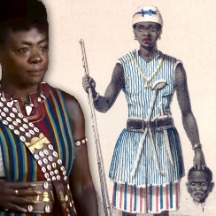I am done blindly watching historical fiction movies and theatrical productions.
Years ago, I would watch such productions without hesitation, then hear media chatter about their accuracy, and later ask Port of Harlem history contributor CR Gibbs which parts were true. He would suggest that I read a book for facts and watch often embellished history-based films and theatrical performances for entertainment.
Do I want to spend two hours being entertained and then four hours learning what is accurate?
Eventually, his words sunk in and now I ask myself before deciding to see such productions: Do I want to spend two hours being entertained and then four hours learning what is accurate?
Seeing American Prophet (American Prophet (Frederick Douglass) – Entertaining, not Liberating) was the last straw. So, I never saw The Woman King and I am ecstatic that I did not.
The movie is about women warriors in Dahomey. "The Dahomey were brutal conquerors who enslaved their enemies and sold most of them for profit," reported History vs. Hollywood. History vs. Hollywood separates the facts from the fiction in some of the most popular true story movies, miniseries, and TV shows.
After reading their account and some others, I now have questions about The Woman King:
1. Many went to the movies knowing the women probably had a sexless marriage with the king. Well, we know from the Catholic, Mormon, and Southern Baptist scandals, that there is more to this story.
The Woman King - Should I Be Cheering for My Enslavers in a White Theater?
Publisher's Point


2. Knowing that the British built Fort Bullen in The Gambia in 1826 to thwart the efforts of some European slave traders, why did the British wait another generation to do the same in Dahomey, around 1852?
3. Why did Dahomey’s King Ghezo resume the slave trade in 1857?
4. Would I feel comfortable sitting in a White theater, in a White neighborhood (since there are only a few in Black neighborhoods) cheering for brutal conquerors who enslaved their enemies and sold most of them for profit?
Last week, we included “The Woman King: The Truth About Slavery Matters,” in Port of Harlem. Though it was the fourth listed article in the issue, it was the second most read story. One reader felt compelled to respond directly to us be email. Thank you, Mr. Cook. I welcome his and your feedback on this article. The one thing I learned from this roller coaster ride: Before another one of these hyped movies come out, I will check History vs. Hollywood’s account.
On The Woman King, History vs. Hollywood surmised, “To make a movie that celebrates the Dahomey is a glaring example of how Hollywood likes to morph history, either by way of omission or outright fabrication. If you're going to watch The Woman King, read about the true story of the Kingdom of Dahomey first. Otherwise, take everything you're seeing with a grain of salt.”
Oh my God, History vs Hollywood sounds like CR Gibbs.
Also See: Lupita Nyong’o Breaks Silence About Why She Departed From ‘The Woman King’ Cast
Henry Louis Gates on his “unsettling experience” on visiting the court of the King of Dahomey
3. Why did Dahomey’s King Ghezo resume the slave trade in 1857?
4. Would I feel comfortable sitting in a White theater, in a White neighborhood (since there are only a few in Black neighborhoods) cheering for brutal conquerors who enslaved their enemies and sold most of them for profit?
Last week, we included “The Woman King: The Truth About Slavery Matters,” in Port of Harlem. Though it was the fourth listed article in the issue, it was the second most read story. One reader felt compelled to respond directly to us be email. Thank you, Mr. Cook. I welcome his and your feedback on this article. The one thing I learned from this roller coaster ride: Before another one of these hyped movies come out, I will check History vs. Hollywood’s account.
On The Woman King, History vs. Hollywood surmised, “To make a movie that celebrates the Dahomey is a glaring example of how Hollywood likes to morph history, either by way of omission or outright fabrication. If you're going to watch The Woman King, read about the true story of the Kingdom of Dahomey first. Otherwise, take everything you're seeing with a grain of salt.”
Oh my God, History vs Hollywood sounds like CR Gibbs.
Also See: Lupita Nyong’o Breaks Silence About Why She Departed From ‘The Woman King’ Cast
Henry Louis Gates on his “unsettling experience” on visiting the court of the King of Dahomey
Advertisers | Contact Us | Events | Links | Media Kit | Our Company | Payments Pier
Press Room | Print Cover Stories Archives | Electronic Issues and Talk Radio Archives | Writer's Guidelines






